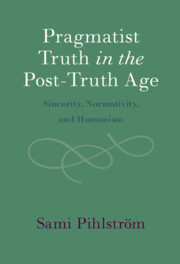Book contents
- Pragmatist Truth in the Post-Truth Age
- Pragmatist Truth in the Post-Truth Age
- Copyright page
- Epigraph
- Contents
- Acknowledgments
- Introduction
- Chapter 1 James’s Children?
- Chapter 2 Religious Truth and Pluralism from a Pragmatist Point of View
- Chapter 3 Around or through Kant?
- Chapter 4 The Will to Believe and Holistic Pragmatism
- Chapter 5 How Is Normativity Possible?
- Chapter 6 Pragmatic Agnosticism – Meaning, Truth, and Suffering
- Conclusion
- References
- Index
Chapter 5 - How Is Normativity Possible?
A Holistic-Pragmatist Perspective
Published online by Cambridge University Press: 14 September 2021
- Pragmatist Truth in the Post-Truth Age
- Pragmatist Truth in the Post-Truth Age
- Copyright page
- Epigraph
- Contents
- Acknowledgments
- Introduction
- Chapter 1 James’s Children?
- Chapter 2 Religious Truth and Pluralism from a Pragmatist Point of View
- Chapter 3 Around or through Kant?
- Chapter 4 The Will to Believe and Holistic Pragmatism
- Chapter 5 How Is Normativity Possible?
- Chapter 6 Pragmatic Agnosticism – Meaning, Truth, and Suffering
- Conclusion
- References
- Index
Summary
Our practices of pursuing the truth and engaging in ethical or existential commitments, analyzed from a pragmatist perspective in the previous chapters, are inherently normative. This chapter considers the transcendental question concerning the very possibility of normativity - that is, the possibility of our engaging in the normative practices we do engage in, including practices of truth-seeking presupposing individual ethical sincerity - from the point of view of a pragmatist transcendental philosophy (as developed in the earlier chapters). It is suggested that such a transcendental question about normativity belongs to philosophical anthropology, as it examines the most basic aspects of the human condition. It is argued that no contingent and naturalizable matters of fact, such as psychological acts of recognition, can adequately ground the possibility of normativity in the transcendental sense. A pragmatist commitment to sincerity thus also entails a commitment to irreducible (but not therefore mystical or supernatural) normativity. A pragmatic and transcendental form of humanism emerges as the only way of making sense of normativity in our lives and practices.
Keywords
- Type
- Chapter
- Information
- Pragmatist Truth in the Post-Truth AgeSincerity, Normativity, and Humanism, pp. 144 - 177Publisher: Cambridge University PressPrint publication year: 2021

